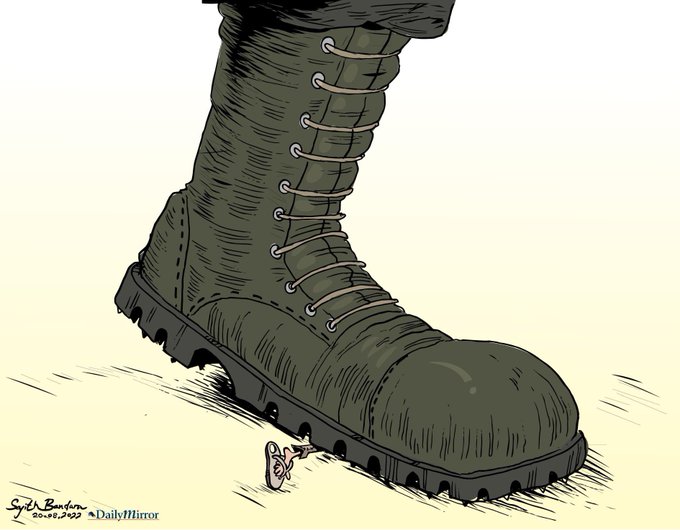Parliament assuming accountability for painful policies
To receive a bailout package of $ 3 billion from IMF, formally known as an Extended Fund Facility or EFF, over the next four and a half years, Sri Lanka as a debtor has agreed to implement a policy package which is normally prescribed by IMF to all its borrowers. This package was approved by Sri Lanka’s Parliament as demanded by President and Finance Minister Ranil Wickremesinghe so that it is the Legislature that will take ownership of and accountability for the policy package relieving the Executive of taking responsibility for that burden. Now the Parliamentarians cannot blame the President or those in the Central Bank or the Ministry of Finance for agreeing to the harsh conditions that are incorporated into the package. They themselves have endorsed it.
Forced curtailment of aggregate demand
It is not clear whether the Parliamentarians in question overwhelmingly voted for it with the knowledge that the policy package being implemented is based on the neoliberal economic ideology. That ideology has several features. First, it believes that the markets can do wonders for an economy. This feature is known as market fundamentalism. Governments cannot do these wonders. Second, the government should not engage in business and, therefore, should divest its ownership in favour of the private sector which can do a better job. Third, arising from the second, if the government is faced with financing difficulties, whether it is current, capital or repayment of past debt, it is perfectly alright to sell some of the government assets to generate the needed cash.
Fourth, if things have turned sour because the nation, including the government, has spent more than it has earned, it should immediately go for an austerity program, known in popular parlance as belt-tightening. In economic terms, this is curtailing the aggregate demand drastically to match the available aggregate supply so that inflation and exchange rate depreciation could be avoided through the overheating of the economy. To attain and sustain this state, market fundamentalism should work through an increase in interest rates and cost reflecting market price adjustment of goods sold by both the government monopolies and private producers.
Fifth, since money printing by the central bank has been the cause of the boosted aggregate demand, its curtailment should be supported by putting a cap on money printing and government financing through such printed money. Sixth, arising from the fifth, to ensure that the central bank will behave properly, it should be made independent from the crutches of outside influencers, namely, those in power and those power groups in society.
Cost-reflecting pricing
There have been three instances of resorting to cost-reflecting pricing by the Government recently. One is the reintroduction of the price formula for fuel prices and making price adjustments every month based on past costs that include both the production cost and the taxes paid to the Government. The second is the imposition of a controlled price on eggs, Rs. 44 per egg or Rs. 880 per kilo, to alleviate the rising cost of living of people. This is a market intervention by the Government in the case of an economic activity engaged by the private sector. Hence, the price control has prohibited the retailers from selling eggs above the controlled price irrespective of the cost of production of the poultry farmers or the purchase price by the retailers.
Since the price per egg fixed at Rs. 44 per egg has been below the costs, it is not ruling in the market. The per kilo price has literally increased the price of an egg well above the costs and it is this price which is now ruling the market functioning as a maximum retail price or MRP. According to market source, the cost of production is lower than this MRP but since the Government has imposed it, the retail market prices have not fallen. Hence, this is an instance of a wrong use of the market intervention by the Government because, instead of helping the consumers, it has imposed an additional burden on them. The third is the upward adjustment of electricity tariff in two rounds, as announced by CEB and the political authorities, to reflect its production costs and avoid making losses.
CEB’s new tariffs reflects more than costs
However, in the absence of an effective public authority to examine the veracity of the costs and the suitability of the tariff, CEB seems to have chosen a tariff structure well above the costs. Those electricity consumers who have installed solar panels on their roofs had been paying the minimum fixed charge of Rs. 30 per month. But in terms of the new tariff structure, they are now paying a charge according to the use of power which amounts, on average, to about Rs. 2,000.
Since the cost is zero according to the bill, it reflects an increase of more than 6,500%, surely not an option those solar panel users would have bargained for. In the case of an ordinary middle-income family, the tariffs as reported in the bill, are about 85% over the cost of production. Hence, the cost reflecting tariff appears to be too harsh for the low level of electricity consumers. If this anomaly is not corrected immediately, the Government will not be able to sell its cost-reflecting price systems.
Leading challengers of neoliberalism
Given these weaknesses in the implementation of the bailout package, a new challenge has now arisen about the validity and suitability of the neoliberal economic ideology. Of them, a leading critic is the Cambridge University Don Gary Gerstle who published his critical review in 2022 under the title The Rise and Fall of the Neoliberal Order. Another is the young American economist Clara Mattei who published in the same year a book challenging the austerity being promoted by IMF package under the title The Capital Order: How Economists Invented Austerity and Paved the Way to Fascism’. The views expressed by them are being given wide publicity in seminars and conferences hosted by top universities in the US and the UK. It is therefore useful to examine their views and see how far they are valid because there is now a growing public opinion in Sri Lanka questioning whether the IMF bailout is the best and whether it will work.
Meaning of an order
An ‘order’ is a system of beliefs about an ideology. When it is used in the context of a particular ideology like the neoliberal order or the capital order, it is generally believed superior to all other ideologies that had existed in the past or present today. What this means is that when we refer to the neoliberal order, we believe that it is superior to all other ideologies in economics like Keynesianism or Socialism or Communism. In the same context, capital order means that capital is superior to the other main input in production, namely, labour. Hence, these ideologies are like dogmas which people tend to believe without questioning them.
 Gary Gerstle: Neoliberalism has now died
Gary Gerstle: Neoliberalism has now died
Gerstle has examined the birth and the death of two such ideologies that have overwhelmed the 20th and early 21st centuries. One is the New Deal Order that prevailed from 1930 to 1980. This order introduced by President Franklin D. Roosevelt emphasised that if markets are left to do everything, it will lead to disastrous results and therefore, the government should intervene in the economy at the cost of the expansion of the government sector. The other is the Neoliberal Order that started in 1970 and ended in 2020.
According to Gerstle, both the New Deal Order and the Neoliberal Order have a political aspect also. The key feature of this political aspect is that the political party that proposes it tends to coerce the opposition parties to accept it as necessary and those politicians in the proposing party keep on justifying the use of the political power to eliminate the opponents. Such anti-democratic measures taken to implement the particular ideology are the main source of its death as well.
This is an important pragmatic observation which the present Ranil Wickremesinghe administration should not take lightly. Democratic economic governance which is an important component of the social market economy being proposed by his administration requires not coercion, but collaboration and cooperation of all parties involved in implementing contentious economic strategies.
 Clara Mattei: Austerity will lead to fascist governments
Clara Mattei: Austerity will lead to fascist governments
Mattei’s main proposition is that austerity which is expected to stabilise an economy is the main source of its eventual death. But it is the main component of the present IMF bailout package which Sri Lanka has promised to implement. According to Mattei, capital order requires policymakers to hold capital above labour and it is the capital owners who will acquire political power to steer an economy. When labour protests are held, sometimes violently, the governments which are supported by capital owners will suppress them. Austerity will come as the solution to the issue of overspending. Governments resort to austerity, according to Mattei, by cutting wages, fiscal spending, and public welfare programs. Such a policy appeases the creditors because they are assured of sufficient funds to meet the government’s debt obligations. But they have devastating effects on the social and economic welfare of ordinary people.
Today, austerity has been the most favoured policy option of countries that have got into trouble due to profligate policy measures adopted by them. But austerity is enforced squarely on low income and middle-income earners. But the high-income earners and those in power are insulated from austerity measures. This social injustice leads to social tension, and social division. The social protests and consequential uprisings are not what the politicians desire. Therefore, in the name of ensuring social stability, the governments resort to repressive measures through the establishment of fascist states. This is what has happened in Latin American countries and in some East Asian countries in the recent few decades.
JR’s repressive measures were costly
The prognosis of the emergence of the fascist state by Mattei and President Ranil Wickremesinghe are a way apart from each other. Mattei says fascism is brought in by governments which want to repress popular uprisings against enforced austerity on people. President Wickremesinghe holds that it is those repressed classes which want to establish fascist states and the government should annihilate such movements by using every power vested with it. As independent observers we can conclude that both types of fascism will kill the society’s desire to establish systems to attain prosperity for people. Hence, instead of attaining social, political, and economic stability, moving toward a fascist state will destroy the ground conditions necessary for attaining that goal.
This was experienced by J.R. Jayewardene after he repressed the popular uprisings against his neoliberal policies in 1980s. His wrong approach in trusting suppression instead of moving for an amicable policy dialogue cost Sri Lanka dearly in the three subsequent decades. His suppression of the strike in 1980 led to three popular uprisings that stunted Sri Lanka’s initial growth initiatives. The rise of Tamil militancy through LTTE, the Indian intervention in Sri Lanka’s domestic affairs, and JVP’s ruse to use Indian presence to fight his Government cut the growth drastically, created balance of payments difficulties, dragged the country to a foreign and domestic debt trap, and finally bankrupted the economy. These are some lessons which the present as well as future administrations in Sri Lanka should learn in the hard way.
Buddha: Austerity should be practiced by all
Is austerity an abhorred practice? Not according to the Buddha. His advice to householder Singalaka in the Singalovada Sutta was to practice austerity for the proper wellbeing of a family. The Buddha said that one should divide his income into four parts. The first part should be used for his own consumption, the second part for the welfare of the family members and outside pious personalities, the third part for investment in enterprises that will generate wealth in the future, and the fourth part as a deposit to meet emergencies in a rainy day. According to this formula, one should consume only 50% of his income, while the balance 50% should be saved and invested.
This is a very strict belt-tightening that should be practiced by all, including the kings, aristocrats, and wealthy classes. Such an inclusive austerity being practiced by all will not lead to social uprisings. Instead, they bring in social harmony by getting the support of all the social classes in a society to implement painful policies. If this is practiced by all, the aggregate demand is voluntarily curtailed obviating the necessity for IMF to preach it or political powers to enforce it.
Sri Lanka has no choice but to embrace austerity
Sri Lanka is in a pathetic situation today. Due to past profligate expenditure programs that have not generated wealth, its Government is bankrupt, and it has resorted to begging from neighbours, rich countries, and international organisations and lending institutions. Such a country cannot ignore the need for practicing austerity at all levels of society. It cannot wastefully spend the money that has been acquired through begging, since begging cannot be repeatedly practiced. At a certain stage, those donors may turn back and say no to pleas by Sri Lanka’s political leaders for further assistance. Sri Lanka has already reached that stage. Hence, austerity is not a choice but a mandatory requirement.
But austerity will lead to the emergence of a fascist state, as Mattei has observed, if it is practiced with exclusivity. But it can be avoided, and it should be avoided, by getting everyone including those in power on board. President Ranil Wickremesinghe should take this challenge seriously. If he continues to resort to repressive practices, he will lose both the nation and its goal to become a rich country by 2048.
(The writer, a former Deputy Governor of the Central Bank of Sri Lanka, can be reached at [email protected].)
Courtesy of the Daily FT
